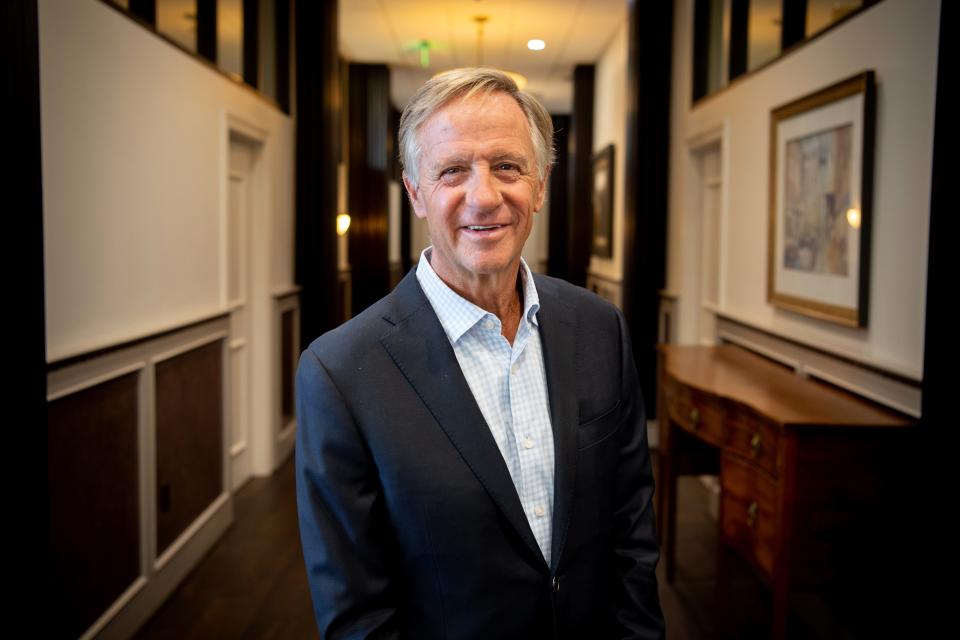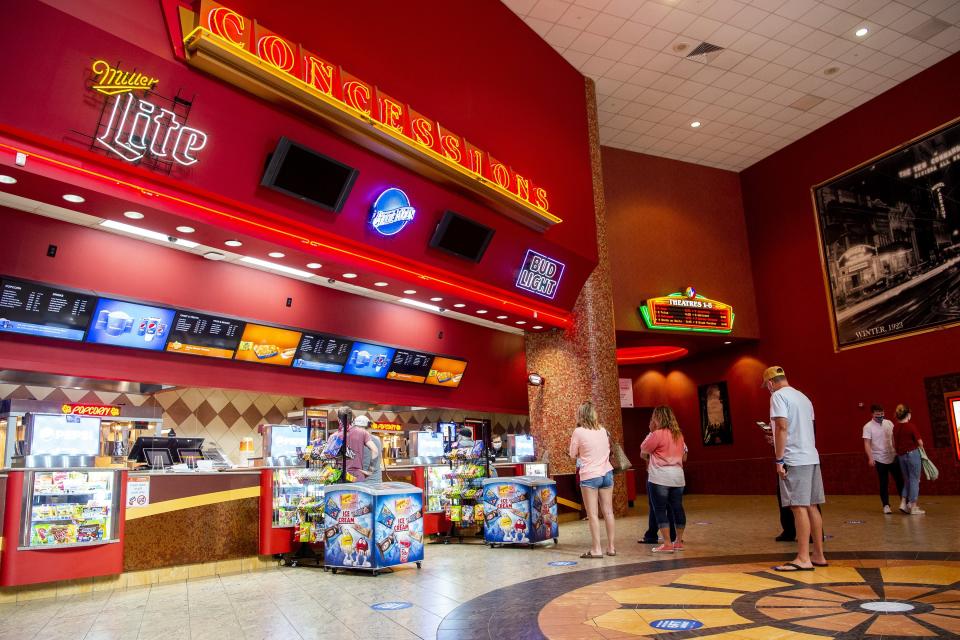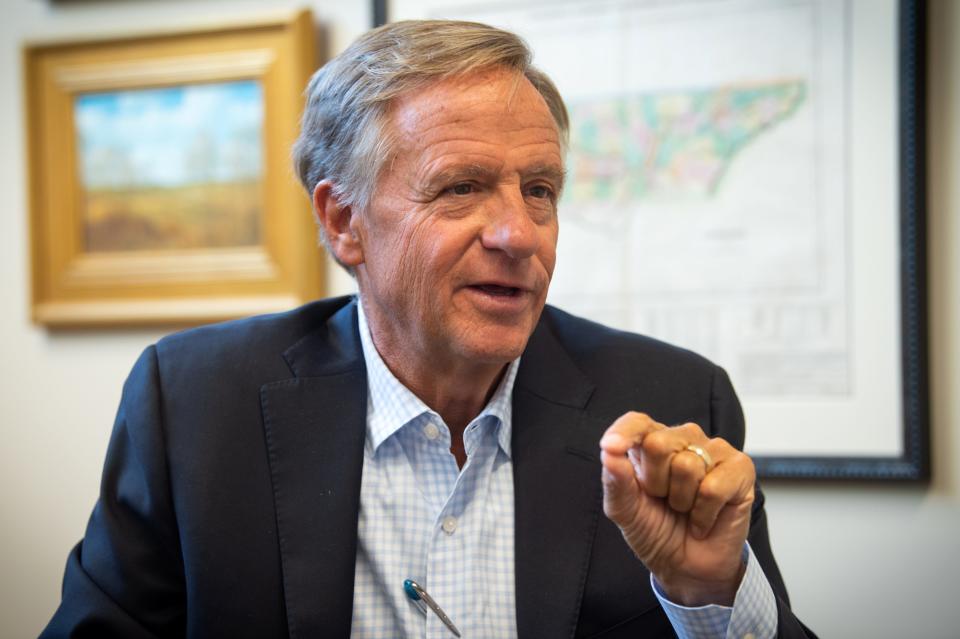20 years later, Bill Haslam on his time leading Knoxville and whether he's the last GOP mayor
- Oops!Something went wrong.Please try again later.
Twenty years ago, Bill Haslam moved from the executive suites of Pilot Company and Wall Street to the more humble Knoxville mayor's office.
Downtown’s revitalization was already underway, and he symbolically took his oath Dec. 20, 2003, in a Market Square that wasn't a wasteland but wasn't yet the bustling centerpiece it is today.
Haslam soon got to work on his campaign promises to bring life back to the city core and build a more functional government for residents.
When Haslam left office seven years later to begin his campaign for Tennessee's governor, downtown was years ahead on its trajectory. It wasn't turning into a replica of Asheville or Nashville, as some tried to suggest, but it was growing fast while maintaining it's identity: Scruffy City still, but with some shine.
Haslam, 65, sat down with Knox News in his downtown office for a far-reaching interview looking back at his time as Knoxville's chief executive and, among other topics, whether he thinks he'll be the last Republican mayor ever elected.
This conversation has been lightly edited for length and clarity.
Knox News: I think most people, when they sit back and think about your time as mayor, they remember what downtown used to look like compared to downtown today. What do you think about the transformation now?
Bill Haslam: There were some pioneers who were forging away long before we showed up to help, but I did think there were some things the city could do to help make it happen.
I think driving it were a couple of thoughts that I had. Number one, you know, I think we're a lot better at it now than we were then, but 20 years ago Knoxville I felt like was having an identity crisis like we'd have some people say, ‘We want to be more like Chattanooga or Asheville,’ or they wanted to be bigger more like Nashville or Atlanta. I kind of always thought we've got some pretty good strengths of our own. Why don't we just go be a better Knoxville?
I thought one of the things that was holding us back was then, it very much felt like we had this battle going on between the geography of Knoxville – where you live. ‘Well, I'm in South Knoxville. I never want to go across a river unless I have to.’ Or, you know, ‘I live north. I'll go to Bearden Hill but I'm not going any further west than that.’ That whole kind of 'one side of town against another' mentality felt like a big thing.

So, I thought one of the benefits to downtown was it was a place that became everybody's living room. And I think that's kind of worked. You know, as downtown and the center part of Knoxville has grown in importance, I think some of the directional distinctions have gone away.
Plus, I mean, if you remember, the city’s constrained. We’ve got certain limits. The annexation battles had been really big prior to that. I knew there wasn’t a whole lot of growth that could come that way. So, I thought the best way to grow is to grow where we already have the infrastructure in place, where there's already buildings and utilities and you're not going to have zoning battles about every new development project. So, those two kind of dovetail nicely.
Civility, justice and mercy: Gov. Bill Haslam on civility, justice and mercy, and whether he has a home in today's GOP
Knox News: Your first foray into public policy or public service was your service on Knoxville's Community Development Corporation board before you ran for mayor. What did you learn from that experience and how did it shape your time as mayor?
Haslam: KCDC kind of plays two roles. It's obviously the housing role that it plays and providing subsidized housing throughout the city, but also plays the development role in coordinating a lot of that. So that was a great eye-opener for me.
So, Market Square, the whole Market Square project, was one of the first things that came up when I was on KCDC. So, seeing the battles back and forth and if you remember at the time there were battles (over whether) we open it back up to cars, which sounds crazy now but that was seriously debated not that long ago.
And then even for the folks who'd been there on Market Square a long time, they weren't really certain that some of the changes we were talking about felt that great to them. So that was a good introduction into public policy and debate and being in the middle of deciding what to do with public assets. And then the whole low-income housing challenge, which remains, or maybe has accelerated to this day, that was that was a helpful learning experience for me, too.
Knox News: You worked really hard and even put some of your own money into the Regal Riviera theater, which was followed by Mast General Store. I’m wondering, as you were conceptualizing what this could look like at the time, what were your expectations were.
Haslam: Two or three things. You know, I think one of the things that can help you in your leadership role is to go look at other places. And I had gone down to Greenville, South Carolina, which is relatively the same size city and when I was there I saw they actually had retail downtown, which was fairly rare in midsize cities at the time.
Knoxville, to Mayor (Victor) Ashe and other people's credit, had started building residential downtown. The Sterchi building had happened. The Emporium building had happened. So, there were some things happening, but there wasn't anything that was going to bring a lot of people downtown from other places. And so, I felt like the movie theater was one of those things that could happen. And we worked really hard to make that happen. There were big debates at the time.

The two big projects were a movie theater and the transit center, which ended up going down in front of the (Knoxville Civic Auditorium and) Coliseum. But, at the time, the idea was to have it be a joint project to have the transit center (and theater). … And we made the decision, no, that's not gonna work. Let's split them up.
Mast I actually saw in Greenville and went down and the man who was the mayor then, Mayor Knox White, took me around and showed me a lot of things. We went into the Mast store and I was thinking, this would be a home run on Gay Street. So, I ran down the folks who owned it and called them and said would you look at Knoxville? He said, well, actually Knoxville is kind of one of the places that we thought we might go someday. So, they came over and spent time and it worked out.
Knox News: The historian Doris Kearns Goodwin is most famous for her work on Abraham Lincoln and her book “Team of Rivals,” which dealt with Lincoln’s knack for placing former opponents in his cabinet. You did something similar with Madeline Rogero, whom you beat in 2003. Can you talk about the reasoning behind that and whether there was pushback at the time?
Haslam: Well, it's interesting. When you go through a campaign it inevitably all feels personal. I mean, no matter how you try to make it.
When you run against somebody you actually get to know them really well because you show up at debates and forums and after a while you can give each other’s speeches, you've heard them so much. And I realized that Madeline really understood community development really well. And she's smart. And, you know, one of the roles the city plays is taking the federal money that comes in here and making certain it's dispersed right and to get the right kind of community development and growth.
And so when that position came open, I just naturally thought of Madeline. In a campaign, it's funny, when you’re the candidate while it feels personal it actually feels more personal to the people around you that are really involved in the campaign. They're putting their whole heart and soul into something. And so, some of those folks were like, ‘Wait, wait wait. You're gonna ask Madeline to join the administration?’ But they, I think, they eventually got over that when they saw that it was a really good decision.”
Knox News: What are you most proud of as you look back on your roughly seven years as mayor?
Haslam: I think it's this: I think we really did try to always focus on what's the right next thing for Knoxville and to kind of ignore the politics of it, ignore some of the previous battles that we'd had, and say, how do we actually solve the problems that we have? And so we started with downtown not being anywhere near what it should be. We started there, and then went and focused on some things that just helped the city.
I mean, this isn't real glittery, but putting 311 in place where people could say, ‘I got a problem. What am I going to do? I’m going to have to start calling 20 different departments.’ Now, I call 311 and they either fix it or they direct me to where I can. I mean, that works.
I’m a city resident still and the other week somebody hadn’t picked up our recycling in four weeks and we called 311. And (Haslam snapped his fingers) our recycling got picked up. Just as a citizen it helps to remember the government is here to serve us and do things that we can't do for ourselves. Nationally, nobody can buy their own army and locally, people can't handle their own utilities and garbage and fire – all those basic services that the city provides.
Knox News: What didn’t you get finished?
Haslam: Oh, that’s a really good question. The reality is there’s always stuff that you could keep doing.
I should say first, two terms is the right amount of time for an executive position. I just firmly believe that. If you can't get it done in two terms, then you probably should move on. But I would probably have said just to continue our focus on how do we make services that we provide to people work better.
And then, you know, it's interesting. I think the city is obviously not in the education business directly any more. The city gave that up to the county (nearly) 40 years ago. I think I would have used the pulpit of being mayor a little more to talk about our education issues because it is so critical when you think about city development and people wanting to live in the city that schools be the very best they can be. Even though you don't have a direct role, I probably would have tried to insert myself into those discussions more.
Knox News: The city has changed in a lot of ways in 20 years. In one way, Knoxville, like many cities, is getting more progressive politically and the county is more of a mix. Are you the last Republican mayor of Knoxville?
Haslam: You know, if it's looked at as always a Republican versus Democrat election, I probably will be. I mean, who knows? One hundred years from now, things change.
But I would actually encourage people and I thought it was a real mistake when the Knox County Republican Party tried to make local elections partisan and I thought was a real mistake when the state legislature made school board races partisan. Because listen, at the end of the day, being mayor is a pretty nonpolitical job. If you look at Madeline (Rogero), Indya (Kincannon) and me, I doubt we're ever going to vote the same in national elections, OK? Philosophically our politics are pretty different. But if you look at what we actually do as mayor, it doesn't differ that much.
Now, maybe the things that we choose to speak out on would be different, but in terms of how we actually run the city, it's not that different. And my fear is, politics has become so nationalized. I remember talking to Eddie Mannis when he ran for mayor (in 2019). And he said I knock on doors and the first question people would ask me would be, ‘What do you think about Donald Trump’ or ‘What's your position on abortion?’ All these questions and none of them have anything to do with being a mayor.
This really is about providing services to people. You pay tax dollars and here's the services you should expect in return and (we should) try to get past the Republican/Democrat deal because I honestly think in local elections, it's a mistake to think that way.
Knox News: How did becoming mayor help prepare you for being governor?
Haslam: I always use the analogy that it’s a little like playing baseball as you’re moving from Double A to the major leagues. It's pretty much the same game. The pitcher's mound is the same distance apart. The bases are the same distance. But the curveballs break a little more and the fastballs are a little faster, and just it's played in front of more people.
But that being said, it was great preparation for me in two or three ways. Number one, there are certain things that are similar being a corporate executive to be in a mayor or governor. I mean, you're leading a group of people, you got a budget to manage, you gotta hire people, etc. But there's a lot of ways it's very, very different. The difference is your city council or state legislature are not your board of directors. They're independently elected and they're there for their own reasons and you have to be able to persuade them – at least more than half of them – to get anything done.

You also realize that there has to be a process involved in things when you're in a public role. You know, in business, it's almost heresy to say the process matters as much as the result. But in government, it kind of does.
I think the third thing it taught me is, you have to remember this stuff all really matters. Ideology and political views matter, but at the end of the day it really is about providing service to people. And the city is a big operating company. The state is a bigger operating company. And being able to provide those services really, really matters. If you're middle income and above, you don't interact with the government nearly as much as if you're lower-middle or lower income. If you’re upper income you get a driver's license, you vote, maybe your kids go to a public school, but it's fairly limited. That's not so true if you're middle income or below.
Tyler Whetstone is an investigative reporter focused on accountability journalism. Connect with Tyler by emailing him at tyler.whetstone@knoxnews.com. Follow him on X, formerly known as Twitter, @tyler_whetstone.
Support strong local journalism by subscribing at knoxnews.com/subscribe.
This article originally appeared on Knoxville News Sentinel: Former Tennessee Gov. Bill Haslam on Knoxville's transformation

